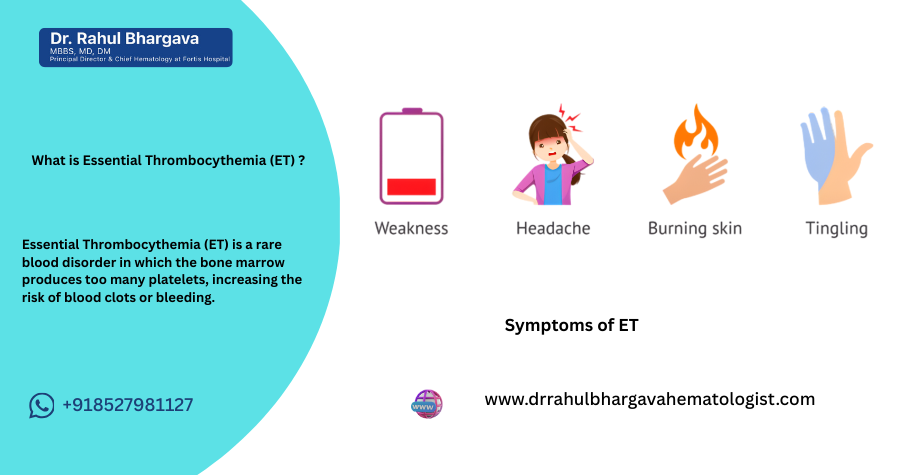Essential Thrombocythemia (ET) Treatment in India

Essential Thrombocythemia (ET) is a rare blood disorder marked by elevated platelet levels, increasing the risk of clots and bleeding. Learn about its causes, symptoms, genetic mutations (JAK2, CALR, MPL), diagnosis, and affordable treatment options available in India.
What is Essential Thrombocythemia?
Essential Thrombocythemia (ET) is a rare, chronic blood disorder characterized by an abnormal increase in the number of platelets in the blood. This condition can lead to an increased risk of blood clots, bleeding, and other complications. While ET is a type of myeloproliferative neoplasm (MPN), it’s important to know that it is a manageable condition with proper medical care.
Types of Essential Thrombocythemia:
Essential Thrombocythemia is classified based on the type of genetic mutation involved:
- JAK2 Mutation Positive ET: The most common type, found in about 50-60% of ET patients.
- CALR Mutation Positive ET: Present in about 20-30% of patients.
- MPL Mutation Positive ET: Found in a smaller percentage of patients.
Causes of Essential Thrombocythemia:
The exact cause of Essential Thrombocythemia is not completely understood. However, it is often associated with mutations in specific genes, such as JAK2, CALR, or MPL. These genetic mutations lead to the uncontrolled production of platelets. While ET is generally not inherited, having a family history of blood disorders may slightly increase the risk.
Symptoms of Essential Thrombocythemia:
- Headaches
- Dizziness or light-headedness
- Vision problems
- Numbness or tingling in the hands and feet
- Easy bruising or bleeding
- Redness or a burning sensation in the extremities
Diagnosis of Essential Thrombocythemia:
Diagnosing Essential Thrombocythemia typically involves:
- Complete Blood Count (CBC): To check platelet levels.
- Genetic Testing: To identify mutations in JAK2, CALR, or MPL genes.
- Bone Marrow Biopsy: In some cases, to assess bone marrow activity.
Treatment for Essential Thrombocythemia:
While there is no cure for Essential Thrombocythemia, various treatments are available to manage symptoms and reduce the risk of complications:
- Medications: Such as Hydroxyurea, Anagrelide, or low-dose Aspirin to control platelet count.
- Targeted Therapy: For specific genetic mutations, such as JAK inhibitors.
- Regular Monitoring: To assess blood counts and adjust treatment as needed.
- Lifestyle Modifications: Including a healthy diet and regular exercise to improve overall health.
Cost of Treatment and Stay in India:
The cost of treating Essential Thrombocythemia (ET) in India is much lower than in many other countries. Key costs include:
Consultation & Diagnosis: INR 2,500 to 5,000 ($30 to $60).
Medications: Hydroxyurea costs INR 2,500 to 6,500 ($30 to $80) per month, while JAK inhibitors may cost INR 80,000 to 2,40,000 ($1,000 to $3,000) per month.
Hospital Stay: General hospitalization costs INR 4,000 to 12,000 ($50 to $150) per day.
Follow-up Visits: INR 1,500 to 4,000 ($20 to $50) every few months.
Frequently Asked Questions
Essential Thrombocythemia is primarily caused by genetic mutations in the JAK2, CALR, or MPL genes, leading to an overproduction of platelets in the bone marrow.
Symptoms may include headaches, dizziness, vision issues, tingling in the hands or feet, easy bruising, and burning sensations in the extremities.
Diagnosis involves a complete blood count (CBC), genetic testing for mutations (JAK2, CALR, MPL), and in some cases, a bone marrow biopsy.
There is no cure for ET, but it is manageable through medications, lifestyle changes, regular monitoring, and in some cases, targeted therapy.
Treatment costs in India are relatively low. Monthly medication expenses range from $30 to $80 for Hydroxyurea and up to $3,000 for JAK inhibitors. Hospital stays and consultations are also affordably priced.